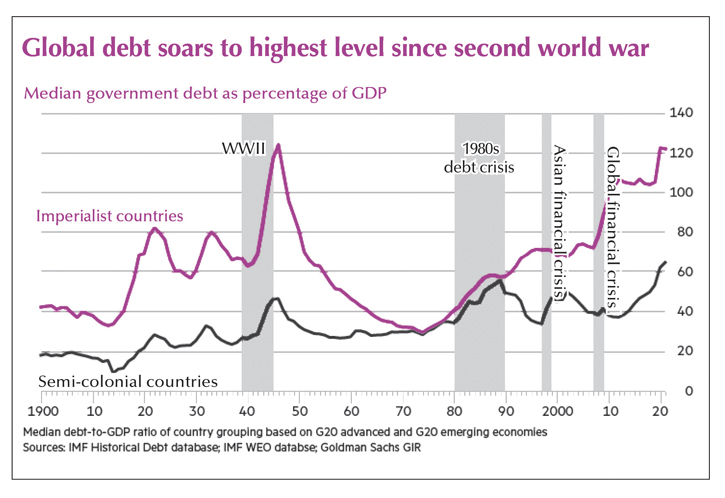Important vanguard struggles are taking place around the world by workers fighting against efforts by the bosses to expand production and profits on our backs.
From strikes by fruit packers in the Yakima Valley in Washington state, to textile workers on strike in Argentina over unpaid wages, to Asarco copper miners on strike for months in Arizona and Texas, to autoworkers fighting against plant closures at Renault in France and Nissan in Spain, and Walmart workers fighting against speedup, these battles — and more — set an example and deserve broad solidarity.
The fruit packers struck at six plants, elected their own strike committees on the picket line, and in several plants won gains. Most importantly, they returned to work more organized and confident to continue to fight to defend their interests.
These strikes and workplace battles have been strengthened by the explosion of protests here and around the world targeting cop brutality. Some 150 Philadelphia sanitation workers, the vast majority of whom are Black, rallied June 9 against attacks on city workers, saying “Black lives matter at work.”
After months of government-imposed lockdowns on production and jobs, capitalist bosses worldwide are pushing to ramp up production, reorganizing their plants, warehouses, supply lines and workforces. Their goal is to maximize their ability to take on rival bosses in the never-ending battle for market share and profits. Many are closing plants, laying off workers, or cutting shifts and hours, while pushing to speed up production on the backs of remaining workers. “Fewer Hours, Less Pay and More Anxiety Greet Returning Workers” was the headline in the June 7 Washington Post.
The depression conditions engendered by the shutdowns came on top of an already sputtering capitalist economic slowdown. The results have accelerated the crisis of the capitalist system. The German government reports industrial production fell 18% in April, with the auto industry hit hardest, down by 75%.
The British economy declined by over 20%. Spain 21.8%, France 20.1%, Italy 19.1% — overall 17.1% across the EU. Auto production in France plummeted 88%. Airbus cut production by a third.
More than 44 million workers in the U.S. have filed for unemployment since mid-March. Another 9.7 million are drawing on the temporary Pandemic Unemployment Assistance benefits from the government to workers deemed self-employed. Though these official figures don’t reflect the actual broader figure of unemployment, they add up to over 53 million workers — over 16% of the entire U.S. population.
The fight for jobs is crucial for workers. Atomized for months by enforced lockdowns, the ability to get back to work, to join with co-workers in discussing and fighting against attacks by bosses hungry for profits, is paramount.
The Socialist Workers Party calls for a massive government-funded public works program to provide jobs at union-scale wages, building things workers need, like housing, hospitals, child care, public transportation and rebuilt infrastructure. The party urges workers on the job to fight to shorten the workweek at no cut in pay to spread jobs around while defending workers’ weekly income.
Workers also face the corrosive effects of inflation. As MarketWatch pointed out June 10, “The government says there’s no inflation — except for the things people are actually buying.” They point to the fact that prices of groceries, rent and shelter, cable TV, health insurance and alcohol are all going up.
Economy starts to open up
With auto plants reopening in Michigan, bosses are busy trying to get back to building profitable pickup trucks and SUVs. But markets for many industrial sectors, from oil and gas to construction equipment, remain severely depressed. Heavy equipment manufacturers Caterpillar Inc. and Deere & Co. have throttled back U.S. factory work with a 30% drop in production.
In the U.S., as around the world, corporations are cutting costs while planning their comebacks. Investment in new plant and equipment has been shelved, on top of decades of slowdown due to the falling rate of industrial profit. Instead, many capitalists have turned to speculation, on gold, bonds and other financial paper, even trying to profit from bets on volatility itself as wild swings in stock prices continue.
The unprecedented levels of government stimulus aimed primarily at helping the bosses ride out the shutdowns have driven global debt levels in the imperialist countries to heights not seen since the second imperialist world war. These debts will become a drag on future growth.
‘Globalization’ shatters
For decades the bosses have sought to increase profits by expanding what they called globalization. This included keeping production and storage costs low for bosses in the imperialist countries by instituting “just in time” delivery, and transferring production of goods and parts to China and elsewhere in the semicolonial world. Higher profits were extracted from exploitation of the cheaper labor power of hundreds of millions of workers and peasants there. The last few months have driven the nail in the coffin of this “business model.”
Supply chains are disintegrating, some production is being repatriated, and trade, political and military tensions are rising among the capitalist bosses in the U.S., China and other powers.
Liberal pipedreams of a return to a never-realizable peaceful stable globalized world presided over by multilateral institutions from the United Nations and European Union to the World Trade Organization lie in tatters. The capitalist rulers worldwide are fighting ever more aggressively over sources of raw materials, markets and profits, while looking to protect their own “national security” interests.
Out of these conditions, millions of textile and garment workers across South Asia have been thrown out of work by the shutdown in orders from fashion and retail stores in the U.S. and elsewhere. Pakistani police using guns and batons charged at hundreds of garment workers demanding better conditions and wages outside their factory in Karachi May 27.
“Most of the textile factory owners are using the coronavirus crisis to lay off workers,” labor activist Farooq Tariq told the Guardian. “The crisis was already going on, but the pandemic has only accelerated it.”
Many already faced months of unpaid salaries. Some 15,000 workers lost their jobs amid a deepening economic crisis in Pakistan, the world’s fifth most populous country. Hundreds of workers in Lahore organized a strike over the nonpayment of wages at several factories in late May.
Workers are fighting in the U.S. as well. Hundreds of public transit workers on the subway system in Staten Island protested outside the Eltingville Transit Center June 10 to demand a new contract and higher pay. Members of Amalgamated Transit Union Local 726 are demanding parity with the contract bosses agreed to on the public transit system for the rest of New York City earlier this year.
They pointed out that the government has been praising them as “essential workers,” continuing to work, as some get sick during the virus outbreak. Now these same bosses refuse to give them a raise. “They call us heroes,” workers chanted, but “they offer us zeroes.”
The fight for jobs, organizing workers, taking on the bosses’ attacks, building solidarity with others in struggle, and political independence from the bosses’ political parties are the road forward.


